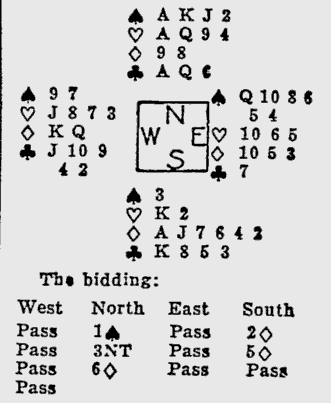Reading Eagle – 9 Sep 1936 by David Burnstine, Merwin D. Maier, Oswald Jacoby, Howard Schenken.
False-carding is a delicate part of defensive play, but it should usually not be attempted by the novice, since he will have a tendency to overdo it and, more often than not, will succeed in fooling his partner rather than the Declarer. Against expert players it is best to vary this phase of defensive play, sometimes false-carding and sometimes making the natural play, since consistency here is undesirable.
In today’s hand, however, East found himself in a situation where a false card play by him should have been considered obligatory, and his failure to make this play cost him a Small Slam.
West, Dealer Neither side vulnerable

Regarding the bidding, while six diamonds was a reasonable contract, six notrump would undoubtedly have offered a greater chance for success. But South, with unbalanced distribution, decided that the former was a better contract.
Declarer’s only problem was of course to hold his trump losers down to one, and with that in mind he took the opening lead of a heart and, finessing the nine of diamonds, lost to West’s King. Dummy captured the next trick and led the eight of diamonds, and here East made the fatal mistake of playing low.
Now Declarer took stock. There were still two diamonds missing—the Queen and the ten. Obviously East held the ten, since otherwise West would have won the first trick with that card. Now if East also held the Q, there was no point in finessing, since East would still hold the Queen-ten. Of course he might still make the hand by means of a coup in trumps, but such plays are always uncertain.
Accordingly, Declarer went right up with the Ace of diamonds, dropped the Queen and made his contract. If on the second trump lead, East had false-carded with the ten as he should have, Declarer aught still have played the Ace. But the better percentage would have been the second finesse, and undoubtedly he would have taken it and lost the contract.


